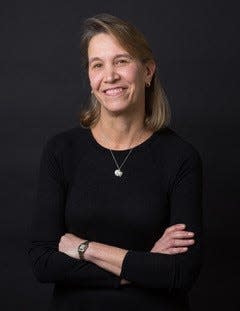I had an abortion after a fatal fetal diagnosis. Amy Barrett could take that choice away.
My stomach dropped when I learned that President Donald Trump had nominated Judge Amy Coney Barrett, a staunch opponent of abortion rights, to the Supreme Court.
Abortion is deeply personal to me. In 1993, I was well into the second trimester of a much desired pregnancy. After a series of miscarriages, I was thrilled everything seemed to be going well. But during the 17th week, a routine ultrasound revealed that our fetus had a devastating anomaly. An anomaly so severe that even if I was able to carry to term, our baby would live only for a few short hours. Stunned and heartbroken, I stumbled out of the room.
My husband and I are both doctors. As we would with any other medical diagnosis, we sought advice from my physician. With her help, we evaluated the treatment options, risks and likely outcomes of continuing my pregnancy. Together, the three of us reached the very difficult decision that I should have an abortion. My husband and I wanted a third child, and it was clear that the physical and emotional toll of continuing the pregnancy would jeopardize and delay the vision we had for our family’s future.
Abortion made our third child possible
We were fortunate we could make that choice. We live in New York, a state where abortion is accessible. We had access to skilled, compassionate doctors and we had insurance to help with our expenses. Unfortunately, this isn’t the case for so many women. Women living in red states face state-enacted barriers to abortion care, like clinic closures, mandatory waiting periods or ultrasounds — all designed to make abortion less available and more expensive. These barriers impede medical care, harming low-income women and communities of color most of all.
If Judge Barrett is confirmed to the Supreme Court, those restrictions will likely become the norm. In her short tenure as a judge, Judge Barrett has voted multiple times to uphold restrictions on abortions and in 2006, she signed onto an advertisement that described the legacy of Roe v. Wade as “barbaric”. If women and families lose the protection of Roe v. Wade they will no longer have the freedom to make their own reproductive health decisions, as I was able to back in 1993. It is because I was able to have an abortion that my husband and I were able to successfully have a third child.

The confirmation of Judge Barrett also risks curtailing the ability of doctors to advocate for their patients and challenge laws restricting abortion. In the recent decision, June Medical Services v Russo, the dissenting conservative justices questioned the long standing precedent and rights of physicians to sue on behalf of their patients. I am indebted to fellow physicians before me who used those rights so that I could have access to an abortion when I needed one. I shudder to think that in the near future, the Supreme Court could limit a doctor’s ability to advocate for the needs of their patients.
Breaking my silence: My family needed me. I had to survive, so I had an abortion.
Each patient and each pregnancy is unique. Every woman should have the freedom to consult with a professional and decide the best course for her pregnancy, regardless of where she lives or how much money she has. As a patient and a physician, I am certain that is the role of a health care provider, not a legislator or Supreme Court justice.
Fortunate in the face of misfortune
After 27 years, my experience and loss is still raw. I can recall every word of the conversation to my then 5 and 3-year-old daughters, explaining that mommy and daddy weren't going to have another baby. Yet, I was incredibly fortunate in the face of misfortune. Good medical care meant my family, my career and my reproductive future weren’t derailed. And importantly, I wasn’t treated like a criminal — instead, I was treated with compassion and respect. I was a patient with a difficult diagnosis and a complex therapeutic decision to make.
Real person, real problem: I was in the pro-life movement. But then, widowed with 6 kids, I prepared for an abortion.
Although my abortion decision was precipitated by a fatal fetal diagnosis, that does not make my situation special or an exception. Every woman deserves a choice for her pregnancy, and access to unbiased counsel and support. I was lucky to live where I did, have access to the care I did and have insurance to pay for it.
We need a Supreme Court justice and a president who believe in the right of all women to have what I had and to protect that right with the law. No one should ever have to rely on luck to get the health care they need.
Dr. Judith S. Simmons is a physician and health care consultant who lives in New York. Follow her on Twitter: @simmonsmd
You can read diverse opinions from our Board of Contributors and other writers on the Opinion front page, on Twitter @usatodayopinion and in our daily Opinion newsletter. To respond to a column, submit a comment to letters@usatoday.com.
This article originally appeared on USA TODAY: Abortion: Amy Coney Barrett would take away choices from women like me

